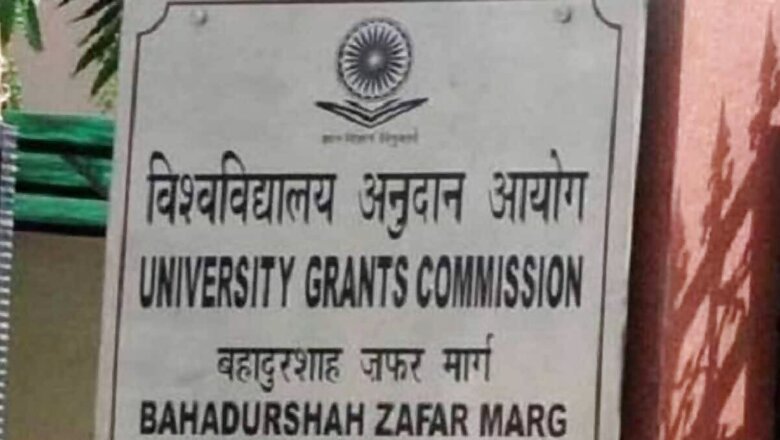
views
A day after the University Grants Commission (UGC) notified regulations for foreign universities to set up and operate their campuses in India, it launched a portal where the institutions can apply for the same on Thursday evening.
Here is all you need to know about how foreign universities can apply, the guidelines and how it will benefit the Indian students.
Which global universities can apply?
According to the UGC portal, Foreign Higher Educational Institutions (FHEIs) aiming to establish their campuses in India should have secured a position within the top 500 in the overall category of global rankings, or should have secured a position within the top 500 in the subject-wise category of global rankings or should possess outstanding expertise in a particular area.
The guidelines titled ‘UGC (Setting up and Operation of Campuses of Foreign Higher Educational Institutions in India) Regulations, 2023’ that were notified on Wednesday state that the FHEIs wanting to set up campuses in the country should have secured a position within the top five hundred in the overall category of global rankings as well as subject-wise category of global rankings at the time of application, as decided by the UGC from time to time.
“In the case of two or more than two FHEIs intending to collaborate to establish campuses in India, each Foreign Higher Educational Institution should meet the eligibility criteria,” the guidelines stated.
What is the procedure for FHEIs to apply?
The application process for the foreign universities will be online and they will be required to submit information on the UGC portal with their application. The universities willing to apply will also submit an undertaking stating that the quality of education imparted in the Indian campus will be similar to that of the main campus in the country of origin; and the qualifications awarded to the students in the Indian campus shall enjoy the same recognition and status as if they were conducted in its home jurisdiction.
What is the procedure for approval?
The UGC will set up a Standing Committee to examine the applications of the FHEIs. “The Standing Committee shall assess each application on merit, including the credibility of the educational institutions, the programmes to be offered, their potential to strengthen educational opportunities in India, and the proposed academic infrastructure, and make recommendations…The recommendations of the Standing Committee shall be placed before the Commission within a period of 60 days from the date of receipt of the application, complete in all respects,” as per the guidelines.
FHEIs will have set up campuses in India within two years from the date of receiving the approval. However, the regulations don’t mention the tenure for which the initial permission will be granted.
How will the FHEIs function?
The guidelines say that no FHEIs shall set up campuses in India without the approval of the Commission. While these universities will have complete autonomy to decide their admission processes and fee structure, the Commission will retain the power to keep a close watch on the operations of these universities.
“FHEIs shall decide the fee structure, which shall be transparent and reasonable. It shall have the autonomy to recruit faculty and staff from India and abroad as per its recruitment norms. The foreign institution may decide the qualifications, salary structure, and other conditions of service for appointing faculty and staff, however, ensuring that the qualifications of the faculty appointed shall be at par with the main campus in the country of origin,” UGC chairperson M Jagadesh Kumar said.
However, the Commission shall have the “power to visit the campus and examine its operations” to ascertain the infrastructure, academic programmes and overall quality and suitability, it said.
Will FHEIs recruit their own faculty?
The regulations state that the FHEIs shall ensure that the international faculty appointed to teach at the Indian campus shall stay in India for at least a semester. They shall have the autonomy to decide the qualifications, salary structure, and other conditions of service for appointing faculty and staff. However, the FHEIs shall ensure that the qualifications of the faculty appointed shall be at par with the main campus in the country of origin.
What types of study programmes are permitted?
FHEIs can offer study programmes leading to the award of certificates, diplomas, degrees, research and other programmes at the undergraduate, postgraduate, doctoral and post-doctoral levels. However, they will not be allowed to offer courses online or in Open and Distance Learning modes.
Will the FHEIs offer any scholarships to students?
Based on an evaluation process, the guidelines state, that the FHEIs may provide full or partial merit-based or need-based scholarships from funds such as endowment funds, alumni donations, tuition revenues and other sources. The guidelines also suggest that the FHEIs may give “tuition fee concessions” to students who are Indian citizens.
Have any universities shown interest in applying yet?
The UGC chief said that many universities are interested. “It will take some time for them to plan and apply,” he said.
Several universities from North America, the United Kingdom (UK), Europe and Australia, among others have shown their interest in setting up campuses here in India while many universities from New Zealand have shown interest in offering joint and dual degree programmes, Kumar earlier told News18.
How will it benefit students in India?
The number of Indian students going abroad to pursue higher studies has only been increasing every year. Kumar had earlier told News18 that healthy competition and collaborations between these campuses and Indian institutes will emerge, improving the general higher education standards.
A win-win situation for India and foreign universities. A win for India because the Indian students will have access to high-quality education right in India, and a win for foreign universities because they will be able to tap the huge appetite of Indian students, whose number is ever increasing.




















Comments
0 comment